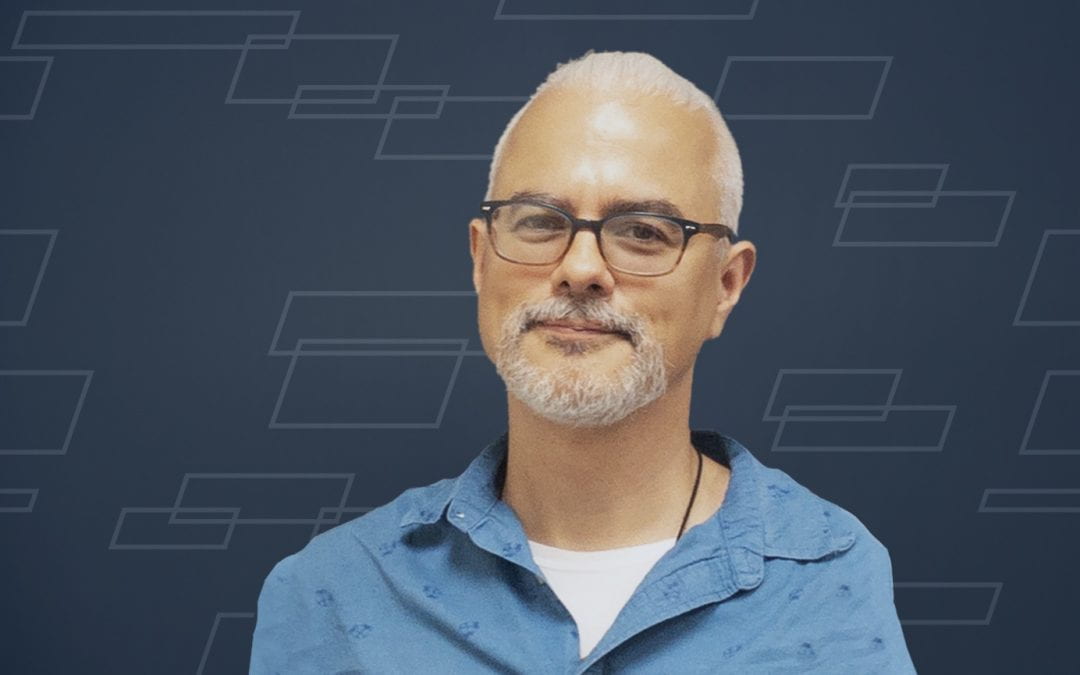
Sep 10, 2020 | Home Page
Teaching and Learning with Technology (TLT) is searching for Penn State faculty who work at the intersection of technology and pedagogy to improve teaching and learning. Those who do can be nominated for the 2021 TLT Impact Award.
The call for nominations for the 2021 TLT Impact Award is open now through Friday, October 16. Given annually, the TLT Impact Award recognizes excellence in teaching and learning at Penn State and celebrates cross-disciplinary projects, courses, and collaborations that have positively enhanced teaching, learning, and the use of learning spaces across the University and beyond.
Penn State tenure-line faculty or non-tenure-line teaching faculty are eligible for nomination. University faculty, staff, and students can submit nominations, and self-nominations also are welcome.
The TLT Impact Award includes a commemorative medal, a $3,000 cash award, an invitation to serve as a TLT ambassador, and additional support to extend the impact of the recipient’s work.
Last year, Pierce Salguero, associate professor of Asian history and religious studies at Penn State Abington, received the TLT Impact Award.
More information can be viewed on the Impact Award’s webpage.
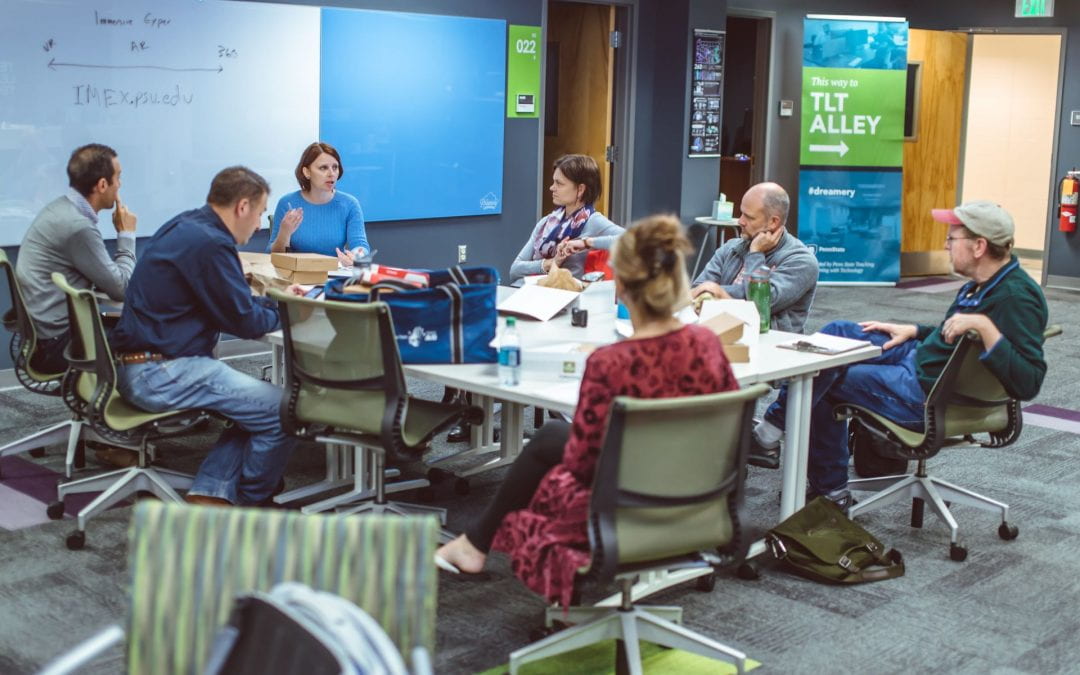
Apr 15, 2020 | Home Page
Teaching and Learning with Technology (TLT) will continue to support Faculty Learning Communities (FLCs) at Penn State for the 2020-21 academic year. This program allows tenure and teaching faculty to explore topics like learning spaces, immersive experiences, data science, and more in peer-led groups.
Leaders are needed for the upcoming year, and applications are now being accepted until May 15, 2020. Proposals selected for support will be announced the week of June 8, 2020.
Applications can be submitted on any topic related to teaching, learning, and technology. Communities that form around these topics will be cross-college, cross-campus, and cross-discipline. Leadership for the FLCs will come from a full-time faculty and receive support from TLT.
Virtual office hours will be held on April 23 from 2:00-3:00, April 27, from 12:00-1:00 May 6 from 12:00-1:00 or on Zoom. Send TLT an email for more information on these sessions, or on applications for 2020-21 FLCs.
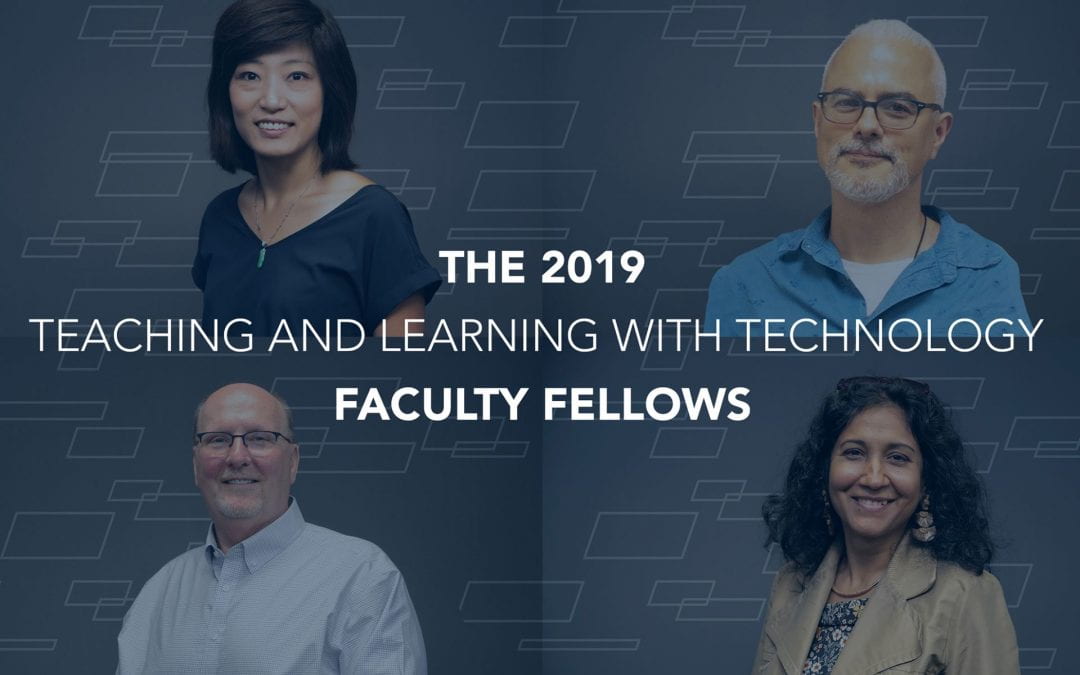
Oct 1, 2019 | Home Page
Teaching and Learning with Technology (TLT) has welcomed four new faculty fellows for the 2019-20 academic year; Ed Glantz, Siu Ling (Pansy) Leung, Pierce Salguero, and Priya Sharma. Each member of the cohort will undertake a project intended to enhance unique spaces where students learn.
“This year’s group of faculty fellows brings a diverse set of perspectives to our theme of learning spaces,” said Kyle Bowen, director of innovation with TLT. “Learning spaces can be physical, digital, virtual, blended, or data-informed places where students interact with course material. Each of our fellows is taking an innovative approach to improve learning spaces, and our staff is eager to support their work.”
For the next year, each fellow will work with a dedicated team of TLT staff to realize the goals set forth by their projects. They cover an array of topics that are strongly influenced by each fellow’s discipline and background.
Ed Glantz – Personalizing Learning Spaces by Streaming and Recording Lectures
Glantz, a teaching professor and assistant director of masters programs in the College of Information Sciences and Technology (IST), will use his project to explore best practices in recording lectures in the classroom and how it can be used for reflective teaching.
“Two years ago, TLT’s BlendLT seminar and the idea of a flipped class planted the seed for this project,” said Glantz. “Recent technological innovations in video management and cloud storage give us the opportunity to expand learning beyond the physical spaces and provide course content in alternative formats.”
Glantz and his team will explore the technical requirements and the pedagogical value of recording lectures in the classroom. This will be paired with new data science capabilities that analyze the topical content in a recorded lecture that will be displayed in a dashboard for the purposes of reflective teaching.
Siu Ling (Pansy) Leung – Using Mixed Reality to Prepare Students for Better Laboratory Learning Experiences
Leung is an assistant teaching professor and director of undergraduate laboratories in the Department of Mechanical Engineering. She will investigate how virtual labs can deliver higher quality learning experiences than traditional science and engineering laboratories.
“Performing experiments from fundamental concepts to complex systems requires tremendous time and space,” said Leung. “For instance, learning how an airplane flies without understanding thrust and drag is impossible. A solution could be to transform fundamental topics experiments into virtual labs so students can visualize and revise concepts at their own pace before performing tests on complex scenarios.”
Along with the intent to create multiple virtual lab experiments for students to conduct, the team will study the impact of technology-enhanced learning, and roadmap a platform designed to help other educators create immersive learning experiences.
Pierce Salguero – Expanding the Asian Studies Classroom Through Virtual Learning Spaces
Salguero, associate professor of Asian history and religious studies at Penn State Abington, will work with his group to build on an ongoing pedagogical project that is used in the classroom to deliver ethnographic data, photography, and short documentary films to students. Immersive technology will be the backbone of the project’s expansion so that students can experience Japanese Buddhist temples without the expense of travel.
“The project’s website provides all content freely through a Creative Commons license,” noted Salguero. “These valuable teaching materials will be available to faculty at other Penn State campuses – and elsewhere throughout the world – as open educational resources. The use of open, public, and free technologies makes the work and content both accessible and sustainable so that, long term, students can have deeper learning experiences.”
The scope of Salguero’s project aims to include interactive maps and virtual tours of Buddhist temples native to Japan and virtual tours of Buddhist temples in Philadelphia. Supplemental to the immersive content will be pedagogical supports that aide faculty in the incorporation of the multimedia materials.
Priya Sharma – Reconceptualizing Places of Learning
Sharma is an associate professor in the College of Education and hopes to use her project to shift the focus from “spaces” to “places” within the context of learning and design. She posits that learning spaces are arrangements of objects, tools, learners, and instructors within a geometrical area while a learning place centers around a lived, personalized experience.
“Penn State is uniquely positioned to engage with the idea of how to create places of learning,” said Sharma. “There is a focus on reinventing and revamping learning spaces across the University’s physical campuses along with World Campus’ continued focus on expanding access to high quality online learning opportunities.”
Beyond knowing that space design requires consideration of seats, scheduling, writable surfaces, etc.; Sharma and her team will work to discover how place design considerations like, “How do users create a common and shared experience through their work within a space,” can work in concert with space design. That would provide the foundation of a framework to guide practical and theoretical learning design and architecture efforts around spaces and places.
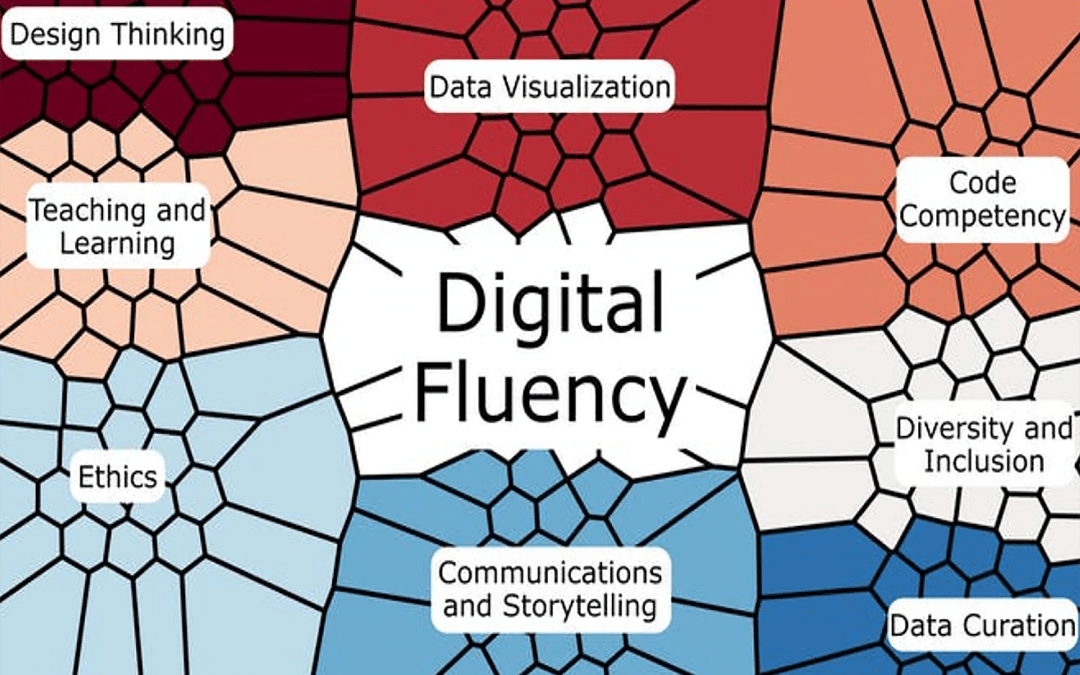
Aug 20, 2019 | Home Page
This October, Teaching and Learning with Technology (TLT) and the College of Agricultural Sciences will team up for a one-day symposium on digital fluency. Registration for the event is open, and it is free to attend.
“The goal of the symposium is to introduce topics and conversations that will develop and define our University community’s understanding of digital fluency,” said Kyle Bowen, TLT’s director of innovation. “Also, attendees will be able to identify resources to support their digital fluency efforts.”
Digital Fluency Symposium: The Future of Teaching, Learning, and Research in a Digital World is scheduled for Wednesday, October 2, 2019, and will take place from 8:00 a.m. to 5:00 p.m. at Robb Hall at the Hintz Family Alumni Center on the University Park campus. A light breakfast, lunch, and refreshments are included with registration.
Speakers at the symposium will each address a specific theme that contributes to digital fluency. They are: code competency, design thinking, data visualization, communication and storytelling, diversity and inclusion, and teaching and learning.
Jennifer Sparrow, associate vice president with TLT, is scheduled to give a presentation at the symposium alongside keynote speaker Evan Peck, Ph.D., assistant professor of computer science at Bucknell University; Kristen Beck, Ph.D., lead bioinformatician with the industrial and applied genomics group in the Accelerated Discovery Lab of IBM Research; and others.
Click here to register for Digital Fluency Symposium: The Future of Teaching, Learning, and Research in a Digital World.
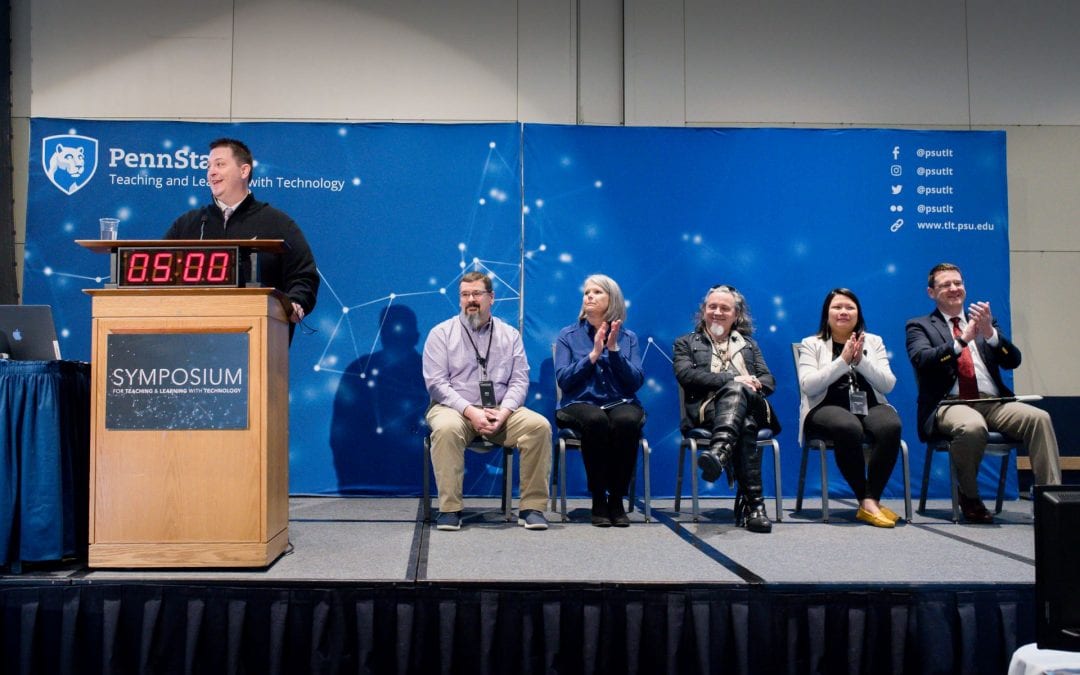
Mar 29, 2019 | Home Page
On Saturday, March 16, more than 500 attendees packed into Presidents Hall at The Penn Stater Hotel and Conference Center to kick off the 26th Symposium for Teaching and Learning with Technology at Penn State. One of the most innovative professional development events of the year at Penn State, no other conference promises to spark your imagination and stoke your curiosity for what is possible for the future of higher education.
In her opening remarks, Jennifer Sparrow, senior director of Teaching and Learning with Technology, touched on Penn State’s commitment to forward-thinking with initiatives such as President Barron’s vision for One Penn State 2025, a guiding framework for University-wide education innovation with a focus on student success and lifelong engagement. “I am proud that Penn State continues to be cutting-edge and Teaching and Learning with Technology collaborates with faculty to explore how innovative technology can transform education to advance student learning.”
Penn State leads the charge in reimagining student learning by tackling the burning discussions in higher education on topics such as immersive learning, connecting education to the workforce of the future, and promoting access and equity.
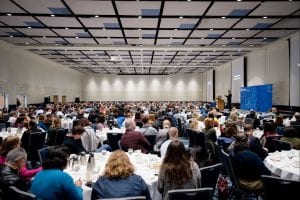
Keynote speaker Dan Heath addresses a crowd of more than 500 attendees at the 2019 TLT Symposium at The Penn Stater Hotel and Conference Center.
After the buffet breakfast, four-time New York Times bestselling author and a Senior Fellow at Duke University’s CASE Center, Dan Heath delivered the keynote address on how to make ideas stick. “Our memories are leaky, fallible, and they deteriorate,” says Heath. “For an idea to stick, it needs to be understood, remembered, and change something.”
Citing the research done by Dr. Michael Palmer, professor of chemistry and director of the Center for Teaching Excellence at the University of Virginia, Heath captivated the audience with his explanation of how Dr. Palmer used learner-centered, backward-integrated design principles to convince instructors to rethink how they create a syllabus to teach their courses. By starting with a goal of what is most important for students to take away from a course and working backward to create the activities and assessments, the core ideas have a chance of sticking long after students leave the classroom.
Heath co-authored four must-read business books, with his brother Chip, including Made to Stick, Switch, Decisive, and their latest, The Power of Moments.
Energized by the keynote speaker’s message, attendees dashed to the concurrent sessions—two before lunch and two afterwards. The most popular sessions covered topics including 3D printing, 360-degree videos, open educational resources, learning the art of storytelling, the future of digital fluency, and leveraging prototypes of artificial intelligence applications to support data empowered learning at Penn State.
The most anticipated aspect of the Symposium every year is the Open Innovation Challenge, where five faculty innovators have five minutes to present their idea in the hopes that it will ignite the attendees’ curiosity and earn their votes as the most impactful.
Professor of Astronomy Chris Palma envisioned technology that will help students embody solar system formations; Faith McDonald, professor of English, hoped to prepare students with digital stories to face workplace challenges; Dr. Matthew Woessner, professor of Political Science, wanted to create 360-degree videos to take students to distant places through virtual reality; Josephine Wee, assistant professor of food science, wanted students to reimagine classrooms without textbooks and embrace interactive content in real-time; and Rodney Allen Trice, professor of practice in the graphic design department of the Stuckeman School at Penn State, won the challenge with his idea “Walk a Mile,” a series of 360-degree videos and photos that create an immersive experience to invoke empathy. Penn State’s Stuckeman School also houses graduate and undergraduate degree programs in architecture and landscape architecture.
Over the course of the year, Trice’s idea will be explored and developed with the help of TLT staff. “Working on the Open Innovation Challenge is the highlight of my year,” explains Zach Lonsinger, learning experiences designer for Teaching and Learning with Technology. “I enjoy having the opportunity to meet and work with amazing faculty who have this contagious enthusiasm and passion for transforming teaching and learning with their big ideas.”
The conference ended with faculty networking over scoops of Penn State Berkey Creamery ice cream while trying out some new technologies such as test driving a BEAM robot and stepping into virtual reality with headsets at the Discovery sessions.
The Symposium for Teaching and Learning with Technology brings together faculty, staff, and innovators to inspire new ideas for what is possible in the future of higher education. It takes one “sticky” idea to inspire innovation that changes the world. From Gutenberg’s printing press to Thomas Edison’s light bulb, curiosity fuels learning, and educators are charged with stoking it.
“It’s incredible how dedicated our faculty, staff, and students are to show up at 7:30 a.m. on a Saturday morning to share the innovative things that they are doing in the classrooms and to learn more about what is happening in the teaching and learning community at Penn State,” says Sara Davis, 2019 Symposium chair and Teaching and Learning with Technology instructional designer. “I want to thank everyone who attended the 2019 Symposium and mark your calendars, the 2020 TLT Symposium will be on Saturday, March 21, 2020. I hope to see everyone next year.”





